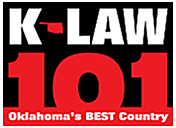
Four Recently Passed Oklahoma Laws You May Not Have Known About
With the talk of the ten commandments on the state capital and the state government's fight on legal same sex marriage, others laws, some good and bad get lost in the white noise that might fly under the radar without us realizing.
Here are some of the laws that have passed in Oklahoma that you may not have known got passed.
- 1
Cannabis Oil As Medication (Katie and Cayman's Law)
In Ma,y Governor Mary Fallin signed into law that the use of cannabis oil could be used for medical purposes. According to cbdfarm.org, cannabis oil can be used to help treat cancer, Alzheimer’s, epilepsy, Lyme disease, chronic pain, rheumatism, multiple sclerosis, anxiety disorders, asthma and diabetes.
Read the full bill at HB 2154
- 2
Exercise of religion by higher education students
This bill, passed in May 2014 prohibits public institutions of higher education to from burdening a student's exercise of religion. According to the bill these burdens include:
1. Constrains or inhibits conduct or expression that reflects a student's sincerely held religious beliefs.
2. Denies a student an opportunity to engage in religious activities.
3. Pressures a student either: (a) to not engage in conduct or expression motivated by a sincerely held religious belief, or (b) to engage in conduct or expression contrary to a sincerely held religious belief.
Read the full bill at: HB 2873
- 3
24/7 Tobacco Free School Act
Passed a little over two months ago the 24/7 Tobacco Free School Act prohibits the use of tobacco products in or on educational facilities as well as in school vehicles, events or activities.
Read the full bill at : SB 167
- 4
The Chase Morris Sudden Cardiac Arrest Prevention Act
Signed into law in May the bill states that any student wishing to participate in a athletic activity, that student's parent or guardian must sign nd return to the student's school an acknowledgement of receipt and review of a sudden cardiac arrest symptoms and warning signs information sheet.
Once a year, the coach of an athletic will undertake a training course to how to handle a sudden cardiac arrest. If a coach does not undertake the course they will not be allowed to act as coach.
If a student collapses or faints without a concurrent head injury while participating in an athletic activity, that student will be removed by the coach from participation at that time. The student will not be allowed to return until evaluated and cleared by a health care provider.
Read the entire bill at : SB 239
More From KLAW-FM






![The Dog Days of Summer Are Here [VIDEO]](http://townsquare.media/site/115/files/2020/07/Capture.jpg?w=980&q=75)
![Fireworks 101: Never Light an Artillery Shell Indoors! [VIDEO]](http://townsquare.media/site/115/files/2020/06/Fireworks.jpg?w=980&q=75)
![Another Fireworks Safety Tip with Critter [VIDEO]](http://townsquare.media/site/115/files/2020/06/Capture13.jpg?w=980&q=75)

